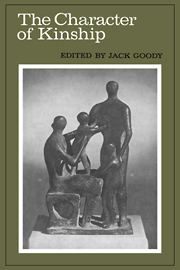Book contents
- Frontmatter
- Contents
- Dedication
- Introduction
- KINSHIP AND DESCENT
- THE NATURE OF KINSHIP
- THE NATURE OF THE FAMILY
- Kinship, Attachment Behaviour and the Primary Bond
- The Matrifocal Family
- Furies, Witches and Mothers
- MARRIAGE AND AFFINAL ROLES
- Bibliography of the Writings of Meyer Fortes
- References
- Index
Kinship, Attachment Behaviour and the Primary Bond
Published online by Cambridge University Press: 07 May 2010
- Frontmatter
- Contents
- Dedication
- Introduction
- KINSHIP AND DESCENT
- THE NATURE OF KINSHIP
- THE NATURE OF THE FAMILY
- Kinship, Attachment Behaviour and the Primary Bond
- The Matrifocal Family
- Furies, Witches and Mothers
- MARRIAGE AND AFFINAL ROLES
- Bibliography of the Writings of Meyer Fortes
- References
- Index
Summary
Kinship, despite a recent blunt assertion that there is ‘no such thing’ is certain to remain one of the central concerns of anthropology, and, in Kinship and the Social Order, Meyer Fortes has given us a masterly discourse which transcends the quirks of anthropological fashion to focus attention on what are fundamental issues.
It is one of Fortes' prime objectives (1969: 250) to ‘establish the thesis that the domain of familial and kinship relations, institutions and values, is structurally discrete’. He does this by analysing a range of ‘ethnographical specimens’, and, on the basis of this evidence, reaches the conclusion: ‘that the realm of custom, belief and social organization, which we descriptively identify by the overall rubric of kinship, is both analytically distinguishable and empirically specifiable as a relatively discrete domain of social structure founded upon principles and processes that are irreducible’. There is, Fortes concludes, something elemental and immutable about kinship relations: a kind of a priori and automatic character that defies further analysis. ‘Kinship’, he observes (ibid: 242), ‘is binding: it creates inescapable claims and obligations’. There is, however, no source apparent, other than kinship itself, to which these claims and obligations can be referred. They exist between kinsfolk, so it would seem (ibid: 238), ‘simply by reasons of the fact that they are kin’.
Here, Fortes is giving recognition to an undoubted characteristic of all close kinship bonds – a characteristic the phenomenology of which may be studied in any human society.
- Type
- Chapter
- Information
- The Character of Kinship , pp. 109 - 120Publisher: Cambridge University PressPrint publication year: 1974
- 2
- Cited by



